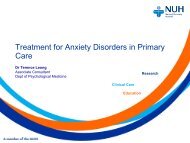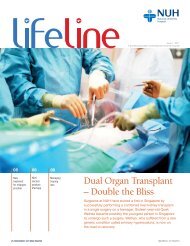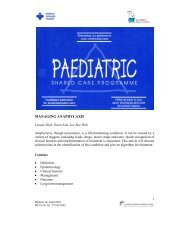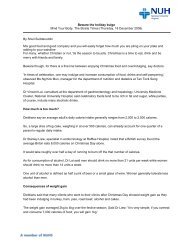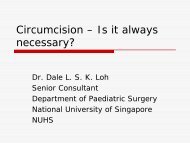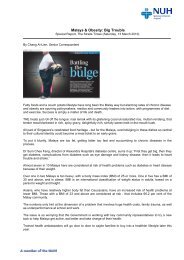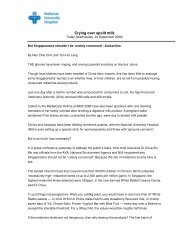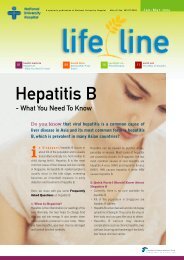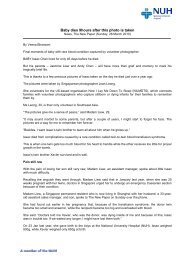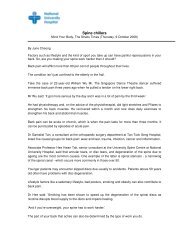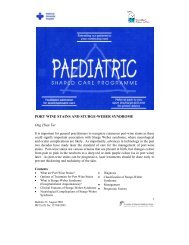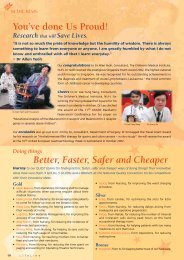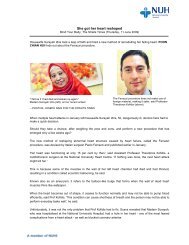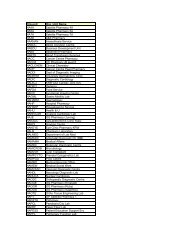TRAVEL CLINIC Stacey Tay Kiat Hong
TRAVEL CLINIC Stacey Tay Kiat Hong
TRAVEL CLINIC Stacey Tay Kiat Hong
You also want an ePaper? Increase the reach of your titles
YUMPU automatically turns print PDFs into web optimized ePapers that Google loves.
<strong>TRAVEL</strong> <strong>CLINIC</strong><br />
<strong>Stacey</strong> <strong>Tay</strong> <strong>Kiat</strong> <strong>Hong</strong><br />
The general practitioner is often questioned on the precautions required when a family<br />
goes travelling, especially to countries with endemic infectious diseases such as<br />
malaria and cholera. He will have to tailor advice for the family based on the following<br />
points:<br />
1. Where the travel destination is<br />
2. What diseases are endemic in the country e.g. malaria, cholera<br />
3. Whether the family will be travelling to a rural area<br />
4. What are the sanitation and clean water facilities available<br />
5. What is the composition of the family, i.e., how old the children are.<br />
We often prefer the patient to visit the doctor or the travel clinic 4 weeks before<br />
departure.<br />
Bulletin 11; January 2000<br />
MITA (P) No: 251/06/2000<br />
1
HOW TO STAY HEALTHY<br />
The family will need simple advice on how to avoid illness, food poisoning and<br />
accidents. The following should be recommended:<br />
Food<br />
• Do not eat food purchased from street vendors.<br />
• Do not eat raw seafood or rare meat<br />
• Do not eat dairy products unless you know they have been pasteurized.<br />
• Wash hands often with soap and water.<br />
A simple piece of advice is to eat nothing unless one can “boil it, cook it, peel it or<br />
forget it”. That is, eat only thoroughly cooked food or fruits and vegetables that the<br />
traveller has peeled and prepared himself.<br />
Water<br />
• Drink only bottled or boiled water, or carbonated (bubbly) drinks in cans or<br />
bottles.<br />
• Avoid tap water, fountain drinks, and ice cubes.<br />
• Make water safer by both filtering through an "absolute 1-micron or less" filter<br />
and adding iodine tablets to the filtered water. "Absolute 1-micron filters" are<br />
found in camping/outdoor supply stores.<br />
Clothing<br />
• Protect the family from insects by remaining in well-screened areas, using<br />
repellents (applied sparingly at 4-hourly intervals), and wearing long-sleeved<br />
shirts and long pants from dusk through dawn. Wear light coloured clothing.<br />
• Reduce problems related to sun exposure by using sunglasses, wide-brimmed<br />
hats, sunscreen lotions and lip protection<br />
• Apply repellents that contain DEET (N,N-diethyl-meta-toluamide) to clothing<br />
and exposed skin. The strength of DEET should be 30 – 35 % for adults and 6<br />
– 10 % for children. Avoid applying repellents to portions of children's hands<br />
that are likely to have contact with their eyes or mouth. Never use repellents on<br />
wounds or irritated skin.<br />
Accidents and activities<br />
• Swim only in well-maintained, chlorinated pools or ocean water known to be<br />
free from pollution.<br />
• Do not swim in fresh water in certain areas of Cambodia, Indonesia, Laos,<br />
Philippines, and Thailand to avoid infection with schistosomiasis.<br />
• To prevent fungal and parasitic infections, keep feet clean and dry, and do not<br />
go barefoot.<br />
• Don’t handle animals, especially stray animals like monkeys, dogs, and cats, to<br />
avoid bites and serious diseases such as rabies and plague.<br />
Bulletin 11; January 2000<br />
MITA (P) No: 251/06/2000<br />
2
• Because motor vehicle crashes are a leading cause of injury among travellers,<br />
walk and drive defensively. Avoid travel at night if possible and always use<br />
seat belts for adults and car seats for the children.<br />
Routine vaccinations<br />
• Carry medical and vaccination records. Ensure that the child has received the<br />
appropriate vaccinations according to schedule.<br />
For travellers over 2 years of age the following immunizations normally given during<br />
childhood should be up to date.<br />
• Measles, Mumps, and Rubella (MMR) Vaccine<br />
• Diphtheria, Tetanus, and Pertussis (DTP or DTPa) Vaccine until age 7, then<br />
DT Vaccine<br />
• Polio (OPV) Vaccine<br />
• Hepatitis B (HB) Vaccine<br />
• Haemophilus Influenza B (HbCV) Vaccine (recommended but not mandatory)<br />
Special vaccinations<br />
• Allow at least 4–6 weeks before the trip to give time for vaccinations to take<br />
effect.<br />
• The type of vaccinations depends on the age of the child, the child’s medical<br />
history, proposed itinerary, duration of stay and purpose for travelling<br />
• Cholera and Meningococcus vaccinations are mandatory for travel to Mecca.<br />
Parents must be reminded that malaria can be fatal. If the child develops fever or flulike<br />
symptoms and medical care is not available in 24 hours, then one dose of Fansidar<br />
(pyrimethamine-sulfadoxine) may be used. The dosage for weight is:<br />
• 5-10 kg: 1/2 tablet<br />
• 11-20 kg: 1 tablet<br />
• 21-30 kg: 1 1/2 tablets<br />
• 31-45 kg: 2 tablets<br />
• >45 kg: 3 tablets<br />
Parents need to be informed that they must bring their child to medical attention if he<br />
or she develops fever or flu-like symptoms during travel to the malaria-risk area and up<br />
to 1 year after leaving the area.<br />
Parents should also be educated on simple mosquito-bite prevention strategies such as<br />
wearing light-coloured long-sleeved clothing, using insect repellents such as DEET and<br />
using a mosquito net for the child’s sleeping area. For greater protection, spray clothing<br />
with and soak bed nets in the insecticide permethrin. Permethrin will repel insects for<br />
several months.<br />
Bulletin 11; January 2000<br />
MITA (P) No: 251/06/2000<br />
3
Medications to bring along<br />
Bring an adequate supply of all prescription medication as well as any necessary<br />
personal hygiene items, including a spare pair of eyeglasses or contact lenses if<br />
necessary.<br />
Other useful medication:<br />
• Oral rehydration preparations<br />
• Anti-diarrheal and anti-emetic medication<br />
• Paracetamol or similar antipyretic medications<br />
• Antihistamines or cough mixtures<br />
• Topical antiseptic cream<br />
• First aid kit with plasters<br />
• Thermometer<br />
• Insect repellant spray (DEET)<br />
For more information, useful web sites to access are:<br />
http://www.cdc.gov/travel/index.htm<br />
http://www.ttsh.gov.sg/medical/frame.htm<br />
http://www.who.int/<br />
Bulletin 11; January 2000<br />
MITA (P) No: 251/06/2000<br />
4
Bulletin 11; January 2000<br />
MITA (P) No: 251/06/2000<br />
Malaria chemoprophylaxis for children<br />
Drug Usage Dosage Side effects Comments<br />
Mefloquine - In areas with - 45 kg: 1<br />
disorders or<br />
tab/week<br />
abnormalities<br />
of cardiac<br />
Doxycycline -An alternative to >8 years of age: GIT upset,<br />
conduction<br />
Contraindicated<br />
Mefloquine<br />
2 mg/kg photosensitivity, in children
Vaccine Indication Type Rou<br />
te<br />
Typhoid<br />
TAB Visit for > 6 Whole<br />
weeks to place cell<br />
with<br />
killed<br />
unsanitary include<br />
conditions paratyph<br />
(Africa, Asia i A & B<br />
Vi polysaccharide<br />
and Latin<br />
America)<br />
Polysacc<br />
haride<br />
Oral<br />
Ty21a<br />
Cholera Extended visit<br />
(>3 months)<br />
in a place with<br />
unsanitary<br />
conditions<br />
(Africa, South<br />
America,<br />
Asia)<br />
Hepatitis<br />
A<br />
Japanese<br />
B<br />
encephali<br />
tis<br />
Yellow<br />
Fever<br />
Meningococcus<br />
A+C<br />
Visit to a<br />
place with<br />
unsanitary<br />
conditions<br />
(Rural areas in<br />
developing<br />
countries)<br />
Visit > 30<br />
days to Asia,<br />
West Pacific<br />
and India<br />
South<br />
America,<br />
Africa<br />
Bulletin 11; January 2000<br />
MITA (P) No: 251/06/2000<br />
Live<br />
(Vivotif<br />
Berna)<br />
Travel vaccines<br />
Age of<br />
1 st<br />
vaccinat<br />
ion<br />
No. of<br />
injections<br />
IM > 2<br />
years<br />
1 -<br />
Inter<br />
val<br />
IM 1 - Nil<br />
(lasts 3<br />
years)<br />
Ora<br />
l<br />
Killed SC/<br />
IM<br />
Killed<br />
whole<br />
virus<br />
Havrix<br />
(SKB)<br />
Vaqta<br />
(MSD)<br />
SC/<br />
IM<br />
3 oral doses eod Not < 3<br />
years<br />
> 1 year 1 - 6<br />
monthl<br />
y<br />
Havrix<br />
> 1 year<br />
Vaqta ><br />
2 year<br />
Killed SC < 3<br />
years<br />
0.5 ml<br />
> 3<br />
years<br />
1 ml<br />
Killed SC/<br />
IM<br />
Middle East Polysacc<br />
haride<br />
vaccine<br />
Rabies Africa, Asia,<br />
Latin America<br />
Influenza Areas of<br />
outbreak<br />
SC/<br />
IM<br />
Killed SC/<br />
IM<br />
Killed<br />
SC/<br />
IM<br />
- 15 yr<br />
needs 1x0.5<br />
ml dose<br />
- 17 yr 50<br />
units<br />
1<br />
mont<br />
h<br />
2 1-2<br />
week<br />
s<br />
Booster Reactogenicity Contraindicati<br />
ons<br />
& Comments<br />
After 6<br />
– 12<br />
months<br />
- < 17<br />
yr 6 –<br />
18<br />
months<br />
- > 17<br />
yr 6<br />
months<br />
Every 4<br />
years<br />
> 1 year 1 - 10<br />
years<br />
> 3<br />
months<br />
A<br />
> 18<br />
months<br />
C<br />
1 - After 3<br />
– 5<br />
years,<br />
then 5<br />
yearly<br />
All ages 2 1<br />
mont<br />
h<br />
All ages 1 1<br />
year<br />
Affected by<br />
concurrent<br />
antibiotics or<br />
antimalarials<br />
Local and<br />
systemic<br />
Take 2 weeks<br />
before travel<br />
Infants < 6<br />
months<br />
Mild Use Hepatitis<br />
A Immune<br />
Globulin<br />
(0.06 ml/kg<br />
or 10 mg<br />
IgG/kg IM)<br />
for infants<br />
less than 12<br />
months<br />
Mild<br />
1 year Mild<br />
Fever, myalgia<br />
and rarely<br />
encephalitis<br />
Egg allergy<br />
Vaccination<br />
certificate<br />
required<br />
Local rare Safe in<br />
infancy but<br />
protection<br />
may not be<br />
complete<br />
when the<br />
child is < 2<br />
years old<br />
- Fever, mild<br />
6



